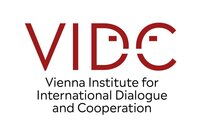- VIDC
- /
- Service
- /
- Publications
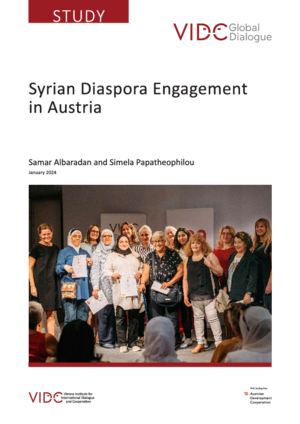
Study: Syrian Diaspora Engagement in Austria
by Samar Albaradan, Simela Papatheophilou, VIDC (ed.), January 2024
The study examines the diverse engagement of the Syrian diaspora in Austria and sheds light on the focal points of their work with a particular focus on development cooperation, humanitarian aid and social and political engagement. It also examines the challenges and needs of the Syrian diaspora with regard to their engagement and formulates recommendations for Austrian organisations and institutions.
Contact for inquiries: Magda Seewald
PDF for Download (Englisch)
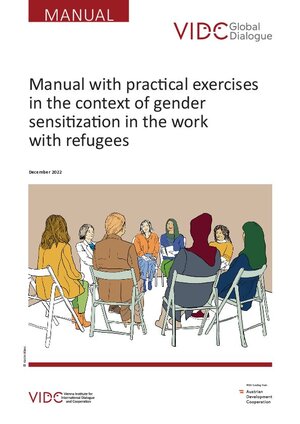
Manual with practical exercises in the context of gender sensitization in the work with refugees
Ein Handbuch mit praktischen Übungen. VIDC, December 2022
The manual we have put together is based on our experiences with a Gender-Tandem-Workshop-Programme for Afghan men and boys and with Afghan women in Austria. The practical exercises encourage the participants to reflect on their own gender role perceptions. While the workshops for women primarily contribute to empowerment, the workshops for men explore alternative perspectives and strategies for action through a critical examination of social (power) relations that disadvantage girls and women and privilege boys and men.
Contact for inquiries: Magda Seewald
PDF for Download
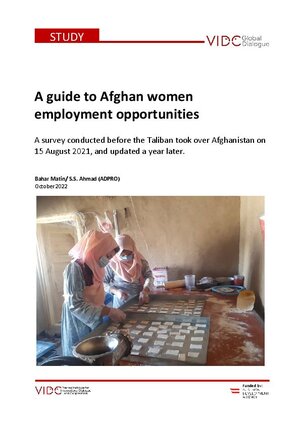
Study: A guide to Afghan women employment opportunities
a Study by Bahar Matin/ S.S. Ahmad (ADPRO). VIDC, October 2022
A survey conducted before the Taliban took over Afghanistan on 15 August 2021, and updated a year later. In the first half of 2021, we researched women-led businesses in ten provinces of Afghanistan. A few months after the regime change, VIDC looked at which of these initiatives were still active.
Contact for inquiries: Michael Fanizadeh
PDF for Download
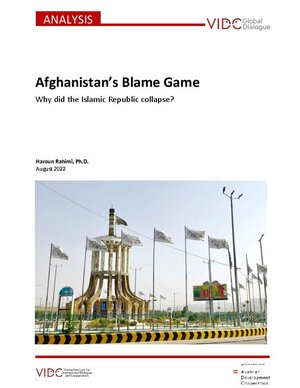
Analysis: Afghanistan’s Blame Game. Why did the Islamic Republic collapse?
An analysis by Haroun Rahimi. VIDC 2022
In Afghanistan, 15 August 2022 marks the anniversary of the complete takeover by the Taliban. How did this happen and what lessons should we learn from it?
Contact for inquiries: Michael Fanizadeh
PDF for download
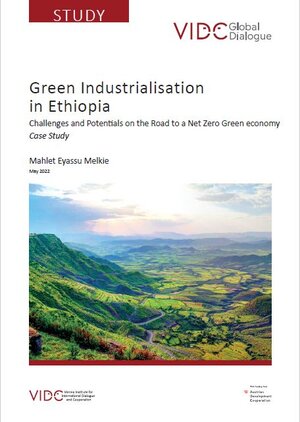
Study: Green Industrialisation in Ethiopia. Challenges and Potentials on the Road to a Net Zero Green economy.
A study by Mahlet Eyassu Melkie. VIDC 2022
The study presents and evaluates Ethiopia's industrialisation strategy within the framework of the Ethiopian "Green Deal" (the Climate Resilience Green Economy strategy). The study also includes policy recommendations.
Contact for inquiries: Martina Neuwirth
PDF for download
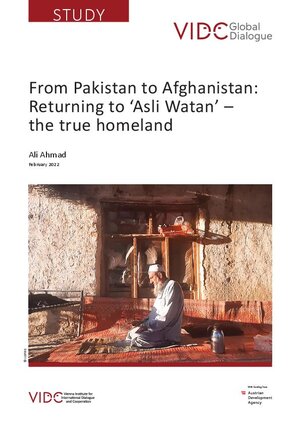
Study: From Pakistan to Afghanistan. Returning to ‘Asli Watan’ – the ‘true homeland’
A study by Ali Ahmad. VIDC 2022
The study examines why Afghans decided to return to Afghanistan from Pakistan before the Taliban took power in August 2021.
Contact for inquiries: Michael Fanizadeh
PDF for download
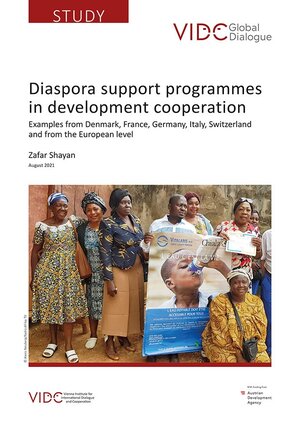
Study: Diaspora support programmes in development cooperation. Examples from Denmark, France, Germany, Italy, Switzerland and from the European level
A study by Zafar Shayan. VIDC 2021
The study examines current diaspora support programs of the European Commission and in five European countries: Denmark, France, Germany, Italy and Switzerland, on the basis of which recommendations for Austria were developed.
Contact for inquiries: Michael Fanizadeh
PDF for download
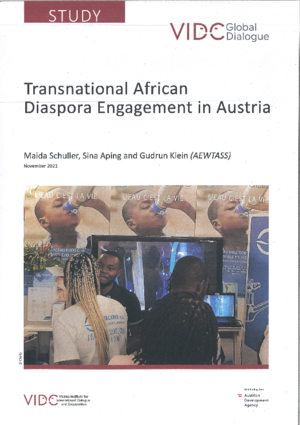
Study: Transnational African Diaspora Engagement in Austria
A study by Maida Schuller, Sina Aping und Gudrun Klein (AEWTASS), VIDC 2021
The study examines the composition of the African diaspora communities in Austria and how they engage in the fields of transnational cooperation with the African continent and awareness raising and education in Austria.
Contact for inquiries: Franz Schmidjell
PDF for download
![[Translate to English:] Transboundaries, Orago, Africa, green growth, green deal, heterodox, economy, ecofeminism, ecotheology, Ubuntu, [Translate to English:] Transboundaries, Orago, Africa, green growth, green deal, heterodox, economy, ecofeminism, ecotheology, Ubuntu,](https://www.vidc.org/fileadmin/_processed_/b/8/csm_transboundaries_front_page_dc80bc2ff3.jpg)
Study: Transboundaries. African heterodox ideologies for the realisation of sustainable development in the continent.
A study by Nicholas Orago. VIDC 2021
The study undertakes an analysis of Sub-Saharan African perspectives on ways leading to climate-friendly sustainable development pathways, through a heterodox lens. The study includes a broad mapping of ideas: from green growth to heterodox socio-economic models, from eco-theology to the philosophy of Ubuntu, from eco-feminism to using law as a ordering tool to enforce sustainable development.
Contact for inquiries: Martina Neuwirth
PDF for download
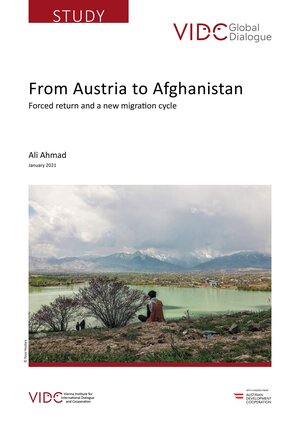
Study: From Austria to Afghanistan. Forced return and a new migration cycle
A study by Ali Ahmad. VIDC 2021
The VIDC researched the question of how deportees in Afghanistan are doing after their return. For this purpose, we spoke with 16 Afghan men who had to return to Afghanistan from Austria between 2015 and 2020. The results of the interviews make it clear that deportations to Afghanistan should be suspended due to increasing violence, economic misery, loss of social networks and stigmatisation.
Contact for inquiries: Michael Fanizadeh
PDF for download (English)
Executive Summary in German
Executive Summary in Dari
Executive Suammary in Pashto
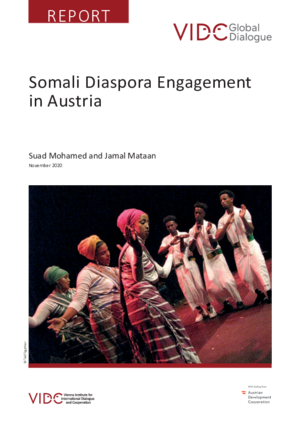
Report: Somali Diaspora Engagement in Austria
Report by Suad Mohamed und Jamal Mataan, VIDC 2020
Around 7,000 Somalis live in Austria. This makes them one of the larger “Africa communities”. But little is known about their diverse social, cultural, educational and transnational engagement. The Somali diaspora organisations in Austria highlighted in this report are chiefly engaged in integration-related activities; providing newcomers with information, orientation and support to assist their smooth transition to life in Austria. Focus areas include education, health, gender equality, democracy, participation, religion and sports. Furthermore, the Somali diaspora has a strong transnational network oriented towards its country of origin, with organisations and individual initiatives acting as bridge builders.
Contact for inquiries: Franz Schmidjell
PDF zum Download
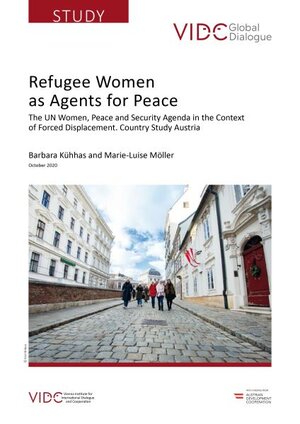
Study: Refugee Women as Agents for Peace. The UN Women, Peace and Security Agenda in the Context of Forced Displacement.
A study by Barbara Kühhas and Marie-Luise Möller. VIDC 2020
The UN “Women, Peace and Security” Agenda (UN Resolution 1325) calls for greater participation of women in peace processes, special protection against gender-based violence in (post) conflict situations, and gender sensitivity in the relief and recovery after armed conflicts. Women who had to flee to Europe are often not included in this agenda, although they can be important agents for peace and gender equality. The study analyzes the EU Regional Action Plan for UN Resolution 1325 in the context of forced displacement.
Contact for inquiries: Lena Gruber
PDF for download
Executive Summary and Recommendations
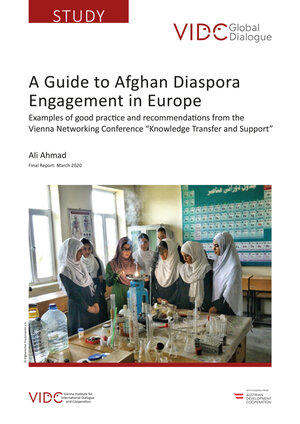
Study: A Guide to Afghan Diaspora Engagement in Europe. Examples of good practice and recommendations from the Vienna Networking Conference “Knowledge Transfer and Support”A study by
A study by Ali Ahmad. VIDC 2020
The guide presents development projects of Afghan diaspora organisations in Europe. The guide also contains recommendations from the networking conference "Knowledge Transfer and Support".
Contact for inquiries: Ali Ahmad and Michael Fanizadeh
PDF for download »
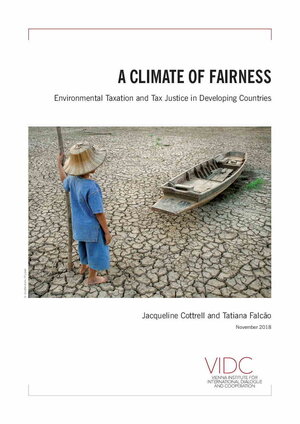
Study: A Climate of Fairness. Environmental Taxation and Tax Justice in Developing Countries
A study by Jacqueline Cottrell und Tatiana Falcão. VIDC 2018.
Countries of the Global South are particularly affected by climate change. But there is often a lack of (tax) revenues for adaptation measures. Can environmental taxes discourage environmentally harmful behaviour unattractive without increasing inequalities? Jacqueline Cottrell and Tatiana Falcão give a comprehensive overview of environmental taxes and their ecological, economic and social impacts in developing countries.
Contact for inquiries: Martina Neuwirth
PDF download
Executive Summary
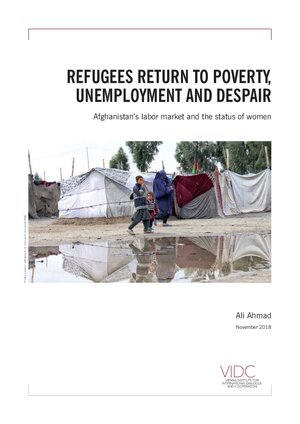
Study: Refugees return to poverty, unemployment and despair
A study by Ali Ahmad. VIDC 2018
The study on the situation of returnees in the Afghan labour market was developed within the framework of the project "Dard Kush - Improving the Livelihood of Afghan Refugees and their Pakistani Host Community", which is coordinated by Caritas Austria and Caritas St.Pölten and financed by the Austrian Development Agency.
Contact for inquiries: Ali Ahmad und Michael Fanizadeh
PDF for download
Summary in Dari
Summary in Pashto
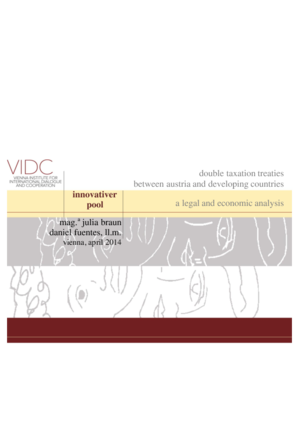
Study: Austrian Tax Treaties signed with Developing Countries - a Legal and Economic Analysis
A study by Julia Braun and Daniel Fuentes. VIDC 2014.
Governments are losing substantial tax revenues due to tax planning and tax avoidance. Double tax agreements (DTAs) can cause revenue losses, especially for countries of the global South. The study aims at answering the question whether Austria´s DTAs are beneficial (or harmful) to those developing countries with which such agreements were signed.
Contact for inquiries: Martina Neuwirth
PDF download
Executive Summary
Research paper: "A Legal and Economic Analysis of Austria's Double Tax Treaty Network with Developing Countries"
